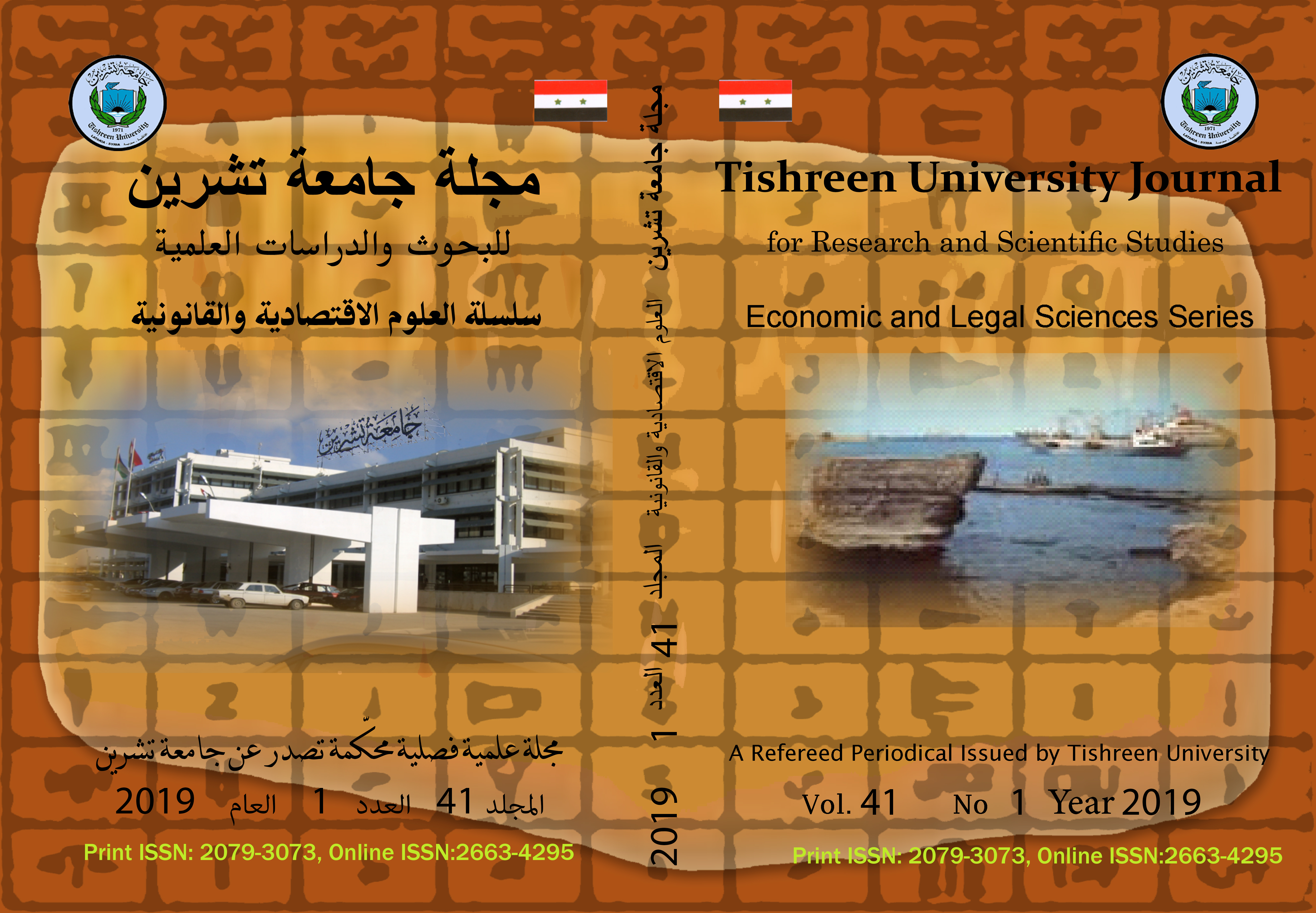بثقافة ريادة الأعمال لدى الشباب الجامعي دراسة ميدانية على عينة من طلبة كلية الاقتصاد بجامعة تشرين
Abstract
مدى الوعي بثقافة ريادة الأعمال لدى الشباب الجامعي
دراسة ميدانية على عينة من طلبة كلية الاقتصاد بجامعة تشرين
غفار أحمد سليمان
يهدف البحث إلى تحديد مدى وعي طلبة كلية الاقتصاد بجامعة تشرين بمفهوم ثقافة ريادة الأعمال، وإظهار الفروق فيما بينهم في مدى الوعي بثقافة ريادة الأعمال تبعاً لمتغيري الجنس والتخصص الدراسي. اعتمد البحث على المنهج الوصفي، وشمل مجتمع البحث جميع طلاب السنتين (الثالثة والرابعة) في كلية الاقتصاد بجامعة تشرين، حيث تمّ اختيار عينة عشوائية شملت (200) طالب وطالبة تمّ توزيع الاستبانة أداة البحث عليهم، وتمّ استرجاع (184) استبانة، واستبعد الباحث (6) استبانات لعدم صلاحيتها للتحليل الإحصائي، وبذلك يكون عدد الاستبيانات المتبقية والصالحة للتحليل (178) استبانة، وبنسبة استجابة بلغت (89%). توصل البحث إلى مجموعة من النتائج أهمها: وجود وعي كبير بثقافة ريادة الأعمال لدى طلاب كلية الاقتصاد عينة الدراسة، وبأهمية نسبية تقابل (75.57%). كما أظهرت النتائج عدم وجود فروق ذات دلالة معنوية بين متوسط درجات طلبة كلية الاقتصاد في مدى وعيهم لثقافة ريادة الأعمال تبعاً لمتغير الجنس، بينما تبين وجود فروق تبعاً لمتغير التخصص ولصالح تخصص إدارة الأعمال بالمقارنة مع التخصصات الأخرى.
The aim of the research is to determine the awareness of the students of the Faculty of Economics at Tishreen University about the concept of the culture of entrepreneurship and to show the differences among them in the extent of awareness of the culture of entrepreneurship according to gender and specialization. The study was based on the descriptive approach. The research society included all students of the third and fourth years in the Faculty of Economics. A random sample of 200 students was selected. The questionnaires were distributed to them, 184 questions were retrieved, the number of questionnaires remaining and valid for analysis (178) was identified, with a response rate of (89%). The study reached a number of results, the most important of which was: The existence of a great awareness of the entrepreneurial culture among the students of the Faculty of Economics, the study sample, with relative importance corresponding to (75.57%). The results showed no significant differences between the average grade of the students of the Faculty of Economics in their awareness of the culture of entrepreneurship according to the gender variable, while differences were found according to the variable of specialization and in favor of the specialization of business administration compared to other disciplines.
Downloads
Published
How to Cite
Issue
Section
License

This work is licensed under a Creative Commons Attribution-NonCommercial-ShareAlike 4.0 International License.
-
The authors retain the copyright and grant the right to publish in the magazine for the first time with the transfer of the commercial right to Tishreen University Journal of Research and Scientific Studies - Economic and Legal Sciences
Under a CC BY- NC-SA 04 license that allows others to share the work with of the work's authorship and initial publication in this journal. Authors can use a copy of their articles in their scientific activity, and on their scientific websites, provided that the place of publication is indicted in Tishreen University Journal of Research and Scientific Studies - Economic and Legal Sciences . The Readers have the right to send, print and subscribe to the initial version of the article, and the title of Tishreen University Journal of Research and Scientific Studies - Economic and Legal Sciences Publisher
-
journal uses a CC BY-NC-SA license which mean
You are free to:
- Share — copy and redistribute the material in any medium or format
- Adapt — remix, transform, and build upon the material
- The licensor cannot revoke these freedoms as long as you follow the license terms.
-
Attribution — You must give appropriate credit, provide a link to the license, and indicate if changes were made. You may do so in any reasonable manner, but not in any way that suggests the licensor endorses you or your use.
-
NonCommercial — You may not use the material for commercial purposes.
-
ShareAlike — If you remix, transform, or build upon the material, you must distribute your contributions under the same license as the original.
- No additional restrictions — You may not apply legal terms or technological measures that legally restrict others from doing anything the license permits.

